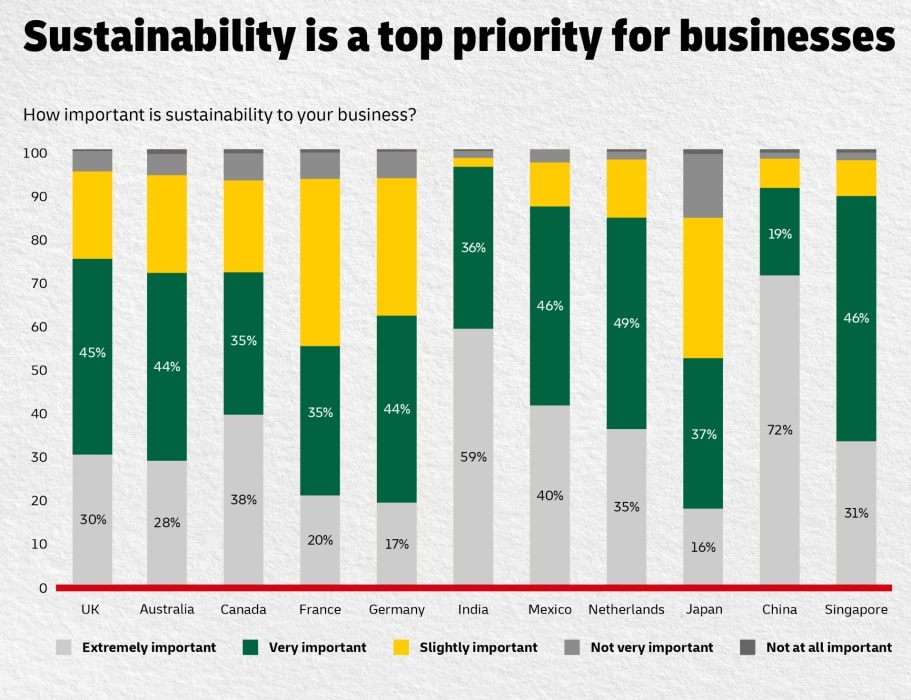Why a sustainability strategy is vital for German e-commerce SMEs
Written by
Editorial TeamPublished on
DHL survey shows German SMEs lag on sustainability strategy. Learn how e-commerce leaders can close the gap and gain competitive advantage.

For German e-commerce leaders, the business case for sustainability has never been clearer. According to DHL Express’ “Global Sustainability Survey of SMEs”, 75% of businesses worldwide now see sustainability as “very important” or “extremely important.” Yet in Germany, only 61% of SMEs share this view – placing the country behind many European peers.
(Image source: www.unsplash.com)
The DHL’s survey, covering 5,437 SME decision-makers across 11 marketss: the UK, France, Germany, the Netherlands, Australia, China, Singapore, Japan, Mexico, Canada and India, confirms that sustainability is no longer optional – it’s a driver of long-term growth. Companies that embed a sustainability strategy not only reduce their environmental footprint but also:
- Strengthen brand reputation by aligning with consumer values.
- Increase competitiveness in crowded global markets.
- Attract ESG-focused investment and improve access to capital.
The gap in seeing an importance of sustainability between Germany and other countries surveyed highlights both a challenge and an opportunity. German SMEs risk falling behind in consumer perception and investor confidence, unless they embed a sustainability strategy into their operations.
Barriers to action
The survey revealed that German businesses face a unique hurdle: getting internal and customer buy-in. In fact, 74% of German SMEs cited this as their number-one barrier to meeting sustainability goals.
At the same time, research from McKinsey shows that 66% of consumers already consider sustainability in their purchasing decisions. For German e-commerce companies, this disconnect suggests untapped growth potential. Customers are ready, but businesses hesitate.
A strong sustainability strategy can bridge this gap by turning consumer expectations into loyalty and positioning German e-commerce brands as credible global players.
Other core challenge to meeting sustainability goals for German SMEs was budget hesitancy as for many German firms, the perceived costs overshadow long-term benefits. But the truth is that sustainability can cut costs in the long term – by reducing waste, lowering failed delivery rates, and increasing energy efficiency.
Germany in the global sustainability landscape
Compared to markets such as India (95%) and China (91%), where SMEs strongly prioritize sustainability, Germany trails significantly. Even the Netherlands (84%) outpaces German businesses in their commitment.

For German executives, this is a wake-up call: lagging adoption doesn’t mean weaker expectations. In fact, Germany’s regulatory environment – shaped by EU directives on carbon reduction, packaging waste, and supply chain transparency – places even greater urgency on developing a robust sustainability strategy.
Sector spotlights: What German e-commerce can learn
The DHL’s survey shows that certain industries are adapting faster than others. For example, fashion which was long criticized for its environmental footprint. Today the sector is changing course. 81% of fashion SMEs rate sustainability as extremely important, and 78% believe sustainable delivery enhances brand image. This shift demonstrates that even “hard-to-absolve” industries can turn sustainability into a competitive advantage.
Another good example: financial services. The sector leads in budget allocation: 88% of SMEs actively invest in sustainability, and 47% believe sustainable delivery strongly drives commercial success. This mindset offers lessons for German e-commerce executives hesitant about ROI.
Last but not least, let’s take a look at technology industry. With electronic waste under scrutiny, tech SMEs prioritize waste reduction. For Germany’s large tech-driven e-commerce sector, this highlights opportunities in refurbishment, recycling, and energy optimization.
What a German sustainability strategy should prioritize
German e-commerce SMEs don’t need to overhaul operations overnight. DHL experts recommend building momentum with small, practical steps listed below.
I. Quick wins
- Reduce office and warehouse energy use.
- Install recycling stations.
- Train employees on sustainability practices.
- Collect customer feedback on green expectations.
II. Mid-level actions
- Shift to eco-friendly packaging: recyclable, biodegradable, and durable.
- Source materials locally to cut transport emissions.
- Reduce failed deliveries through On-Demand Delivery, letting customers choose flexible delivery windows or parcel lockers.
III. Long-term levers
- Partnerships with sustainable logistics providers, increasingly vital in markets like India and Mexico, where sustainability is a top customer priority.
- AI-powered logistics optimization as smarter routes cut fuel and speed up delivery.
- Implementing Sustainable aviation fuel (SAF).
Each of them strengthens competitiveness while meeting the rising expectations of German consumers and regulators.
The commercial benefits for German e-commerce leaders
A robust sustainability strategy delivers more than compliance:
- Customer growth – Nearly 80% of shoppers want sustainable options.
- Cost savings – Waste reduction and efficiency improvements lower expenses.
- Investor confidence – ESG-aligned companies attract more funding and partnerships.
- Future-proofing – Compliance with EU regulations ensures long-term market access.
For German executives, sustainability is not just about reputation – it’s a tool to future-proof operations and secure competitive advantage.
Conclusion
The DHL’s survey sends a clear signal: Germany’s SMEs lag global peers in sustainability adoption, but the opportunity to lead remains open.
For German e-commerce executives, embedding a strong sustainability strategy can close the gap. By starting small, securing internal buy-in, and leveraging solutions like DHL’s GoGreen Plus, SMEs can transform sustainability from a compliance exercise into a powerful growth lever.
The choice is simple: lead the way in Europe’s sustainable e-commerce future—or risk being left behind.
***


